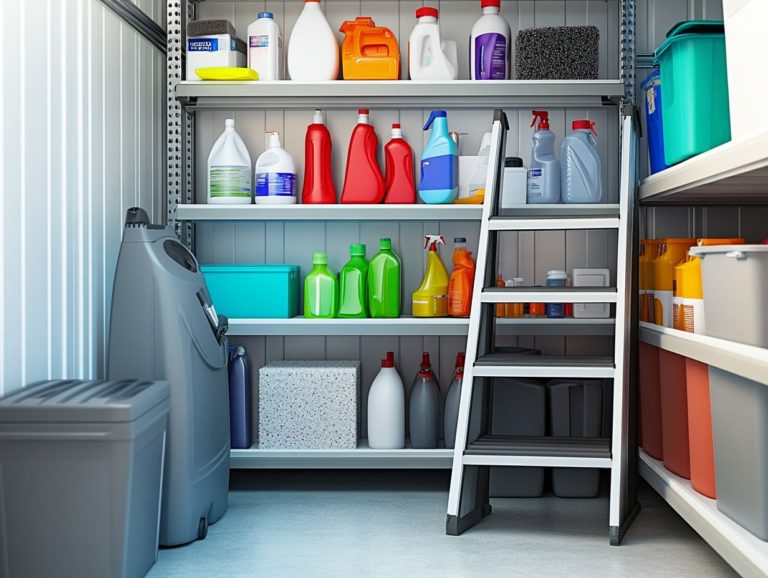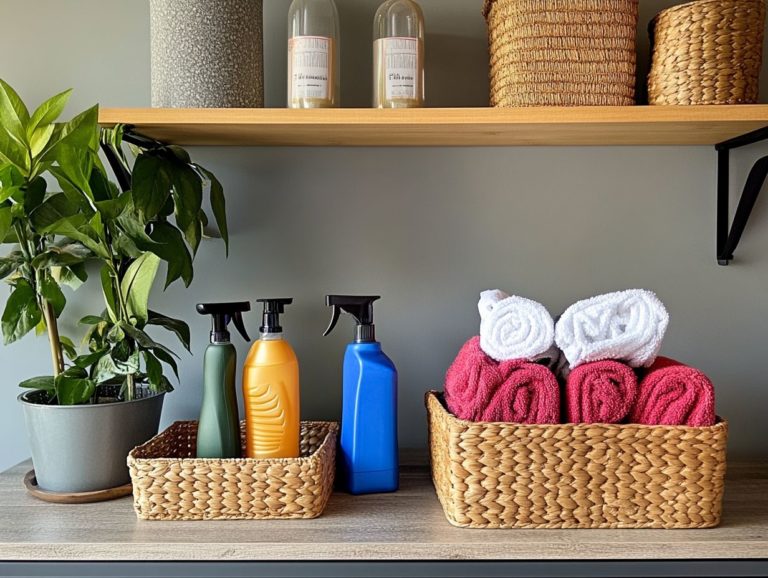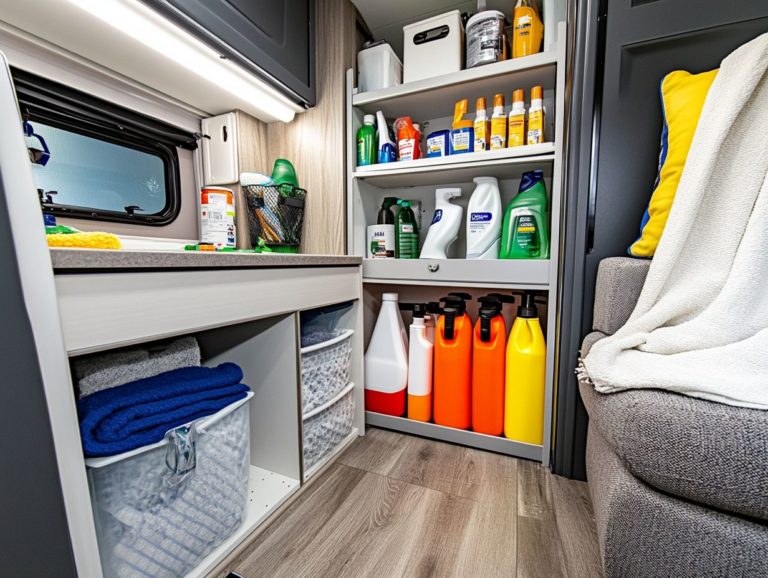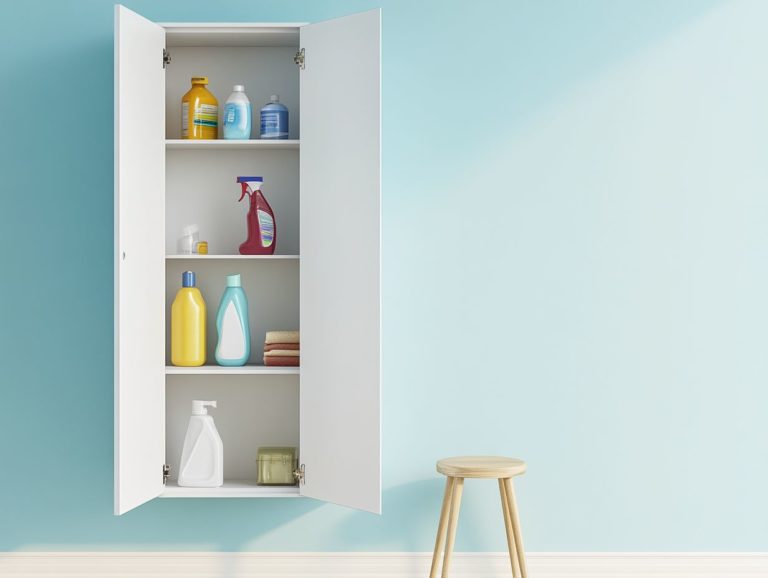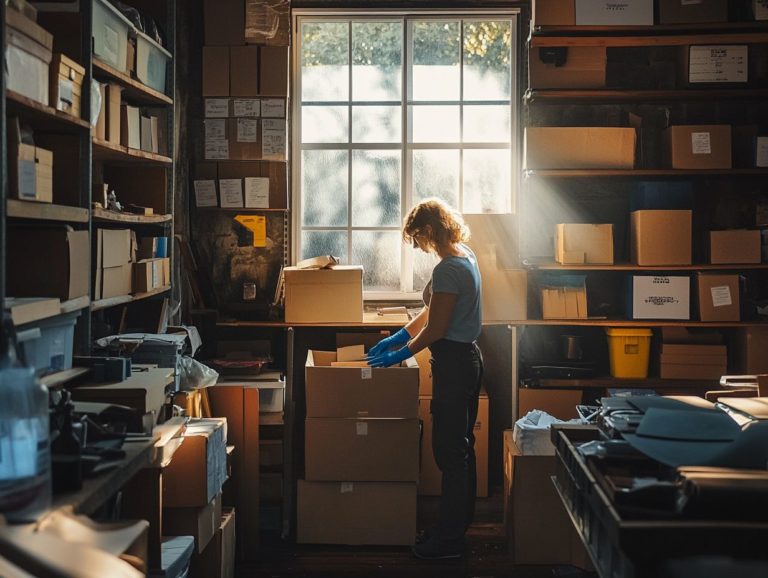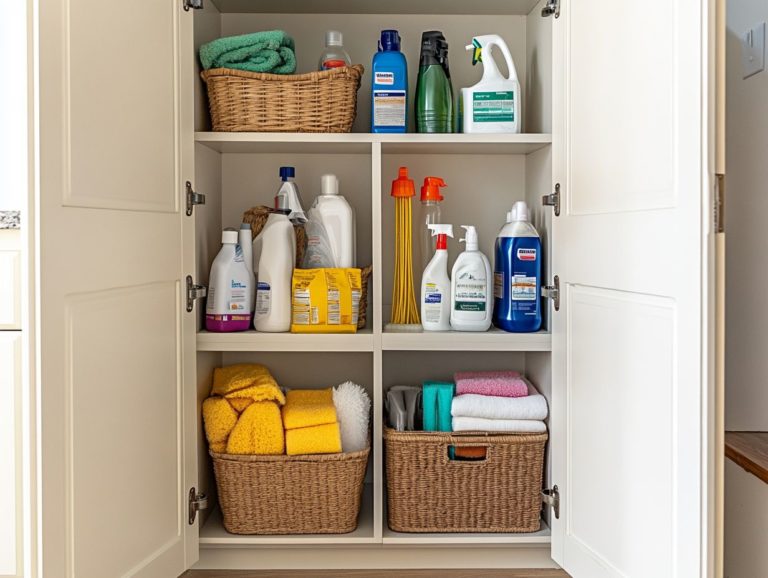How to Store Cleaning Supplies Without Risk
Keeping your cleaning supplies stored properly is key to a safe and healthy home. This is especially important when handling cleaning products regularly.
Neglecting this responsibility can expose you to significant risks, including inhalation hazards, skin irritation, and the potential for accidental ingestion, particularly for children under six.
This article explains why proper storage is important. It also offers practical tips for keeping your cleaning products organized and secure, ensuring effective household cleaning and safety for everyone.
It also presents effective and eco-friendly natural alternatives, such as plastic-free cleaning options from companies like Blueland and EarthHero, so your cleaning routine remains safe and sustainable.
Contents
- Key Takeaways:
- Why You Must Store Cleaning Supplies Properly
- What are the Risks of Improperly Stored Cleaning Supplies?
- How to Properly Store Cleaning Supplies?
- What are Some Alternative, Natural Cleaning Supplies?
- Frequently Asked Questions
- What are some tips for storing cleaning supplies without risk?
- How can I safely store cleaning products in a small space?
- Is it safe to store different types of household cleaning products together?
- What is the ideal temperature for storing cleaning supplies to avoid health issues?
- How should I dispose of old or expired cleaning supplies according to cleaning chemical safety guidelines?
- What are some alternative storage options for cleaning supplies to enhance safety and organization?
Key Takeaways:
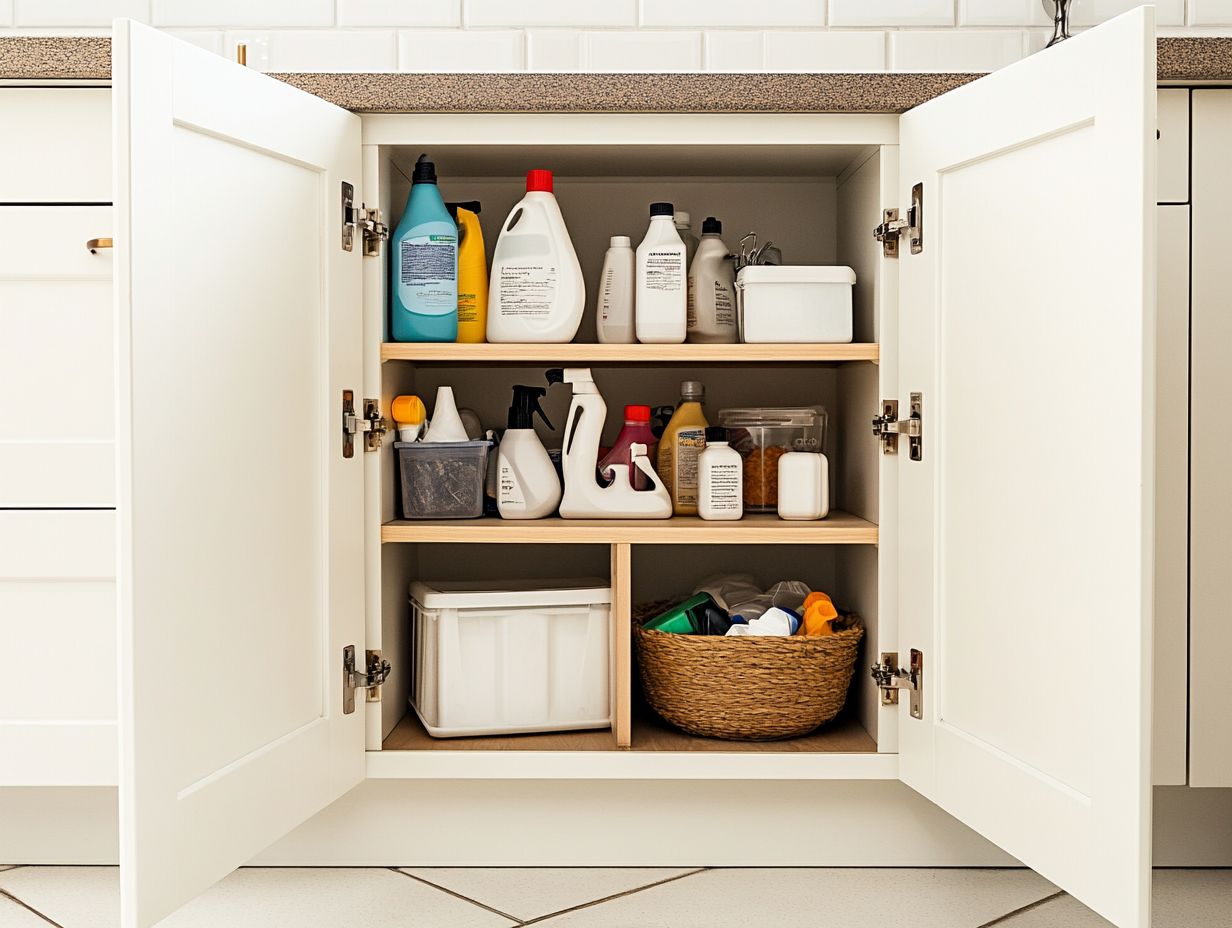
- Proper storage of cleaning supplies is crucial to avoid health risks such as inhalation, skin irritation, and accidental ingestion, as highlighted by the American Cleaning Institute.
- To store cleaning supplies safely, keep them out of reach of children and pets, in a cool and dry place, and separate chemicals properly, following safety tips provided by OSHA and other safety organizations.
- Consider using alternative, natural cleaning supplies like vinegar, baking soda, lemon juice, essential oils, and castile soap as safer options for your home and the environment, promoting nontoxic cleaning.
- For more detailed strategies, check out this guide on how to store cleaning supplies in small homes.
Start organizing your cleaning supplies today to ensure a safer home!
Why You Must Store Cleaning Supplies Properly
Proper storage of cleaning supplies is crucial for maintaining a safe household environment, especially given the array of cleaning products and chemicals typically used in daily routines. Adhering to a chemical safety program can greatly enhance overall safety.
When these supplies are not stored correctly, it can lead to accidental exposures particularly among children under six, who may not understand the risks associated with handling these products. The American Cleaning Institute emphasizes that securing cleaning supplies can significantly reduce potential health issues and foster a culture of chemical safety in your home.
Now more than ever, securing your cleaning supplies is vital to protect your family and pets from harmful substances through proper storage techniques.
What are the Risks of Improperly Stored Cleaning Supplies?
Improperly stored cleaning supplies can pose significant risks, potentially leading to health issues for children, pets, and adults alike. This underscores the importance of following essential safety tips.
When cleaning chemicals aren t stored correctly, they can lead to various forms of accidental exposure think inhaling toxic fumes, experiencing skin irritation from contact, or even accidentally ingesting harmful substances. Conducting regular safety checks can help mitigate these risks.
In the United States, organizations like the National Capital Poison Center and national poison control provide critical data on the alarming number of poisoning incidents related to household cleaners. This highlights the pressing need for vigilance when handling these products. Utilizing resources like the Poison Help Line can provide immediate assistance in case of accidental exposures.
1. Inhalation
Inhaling fumes from improperly stored cleaning products can lead to serious health consequences, ranging from mild irritation to severe respiratory issues. The harmful chemicals that can evaporate into the air found in many cleaning products can cause long-term health problems when inhaled repeatedly, especially in poorly ventilated spaces.
Symptoms may include headaches, dizziness, and throat irritation. Prolonged exposure could escalate into chronic conditions such as asthma or other respiratory illnesses. It s essential to ensure proper ventilation when using these products. Opening windows, utilizing exhaust fans, or investing in air purifiers can significantly reduce your exposure to harmful fumes.
Be particularly cautious with common household cleaners like bleach, ammonia, and aerosol sprays, which are notorious for releasing toxic vapors. Being aware of the potential risks associated with these cleaning agents is crucial for maintaining a safe and healthy indoor environment for yourself and your loved ones. Utilizing product labels for guidance can also help you handle these substances safely.
2. Skin Irritation
Skin irritation often arises from unintentional contact with cleaning chemicals, especially for those who clean their homes regularly without protective gear. The harsh ingredients in many cleaning supplies can lead to rashes, burns, or allergic reactions. This highlights the need for nontoxic cleaning alternatives.
Research shows that about 15% of the population experiences skin irritation from cleaning products. Common offenders include bleach, ammonia, and various surfactants, which are substances that help break down dirt and grease. These irritants can also trigger respiratory issues in sensitive individuals.
By choosing nontoxic options like vinegar and baking soda, you can significantly reduce the risk of skin reactions while still achieving effective cleaning results. Make sure to wear gloves, use diluted solutions, and maintain adequate ventilation to protect yourself against irritation and promote a healthier cleaning environment.
3. Accidental Ingestion
Accidental ingestion of cleaning products can be very dangerous, especially for children under six, who may mistake brightly colored laundry packets for candy. The risks are alarming, as national poison control agencies often respond to poisoning cases linked to improper storage.
Statistics show that thousands of children require medical attention each year after ingesting harmful substances found in household cleaners, including liquid laundry packets. This emphasizes the need for vigilance among caregivers.
To minimize risks, store all cleaning supplies in high cabinets or locked containers, well out of reach of curious little hands. Implementing a chemical safety program can further enhance your household s safety practices.
Educating children about the dangers of these products is crucial. Use simple language to explain the potential hazards. Reinforcing that these items are not toys helps them understand the importance of safety in their environment. Regular safety checks and proper organization of supplies can also help reduce risks.
How to Properly Store Cleaning Supplies?
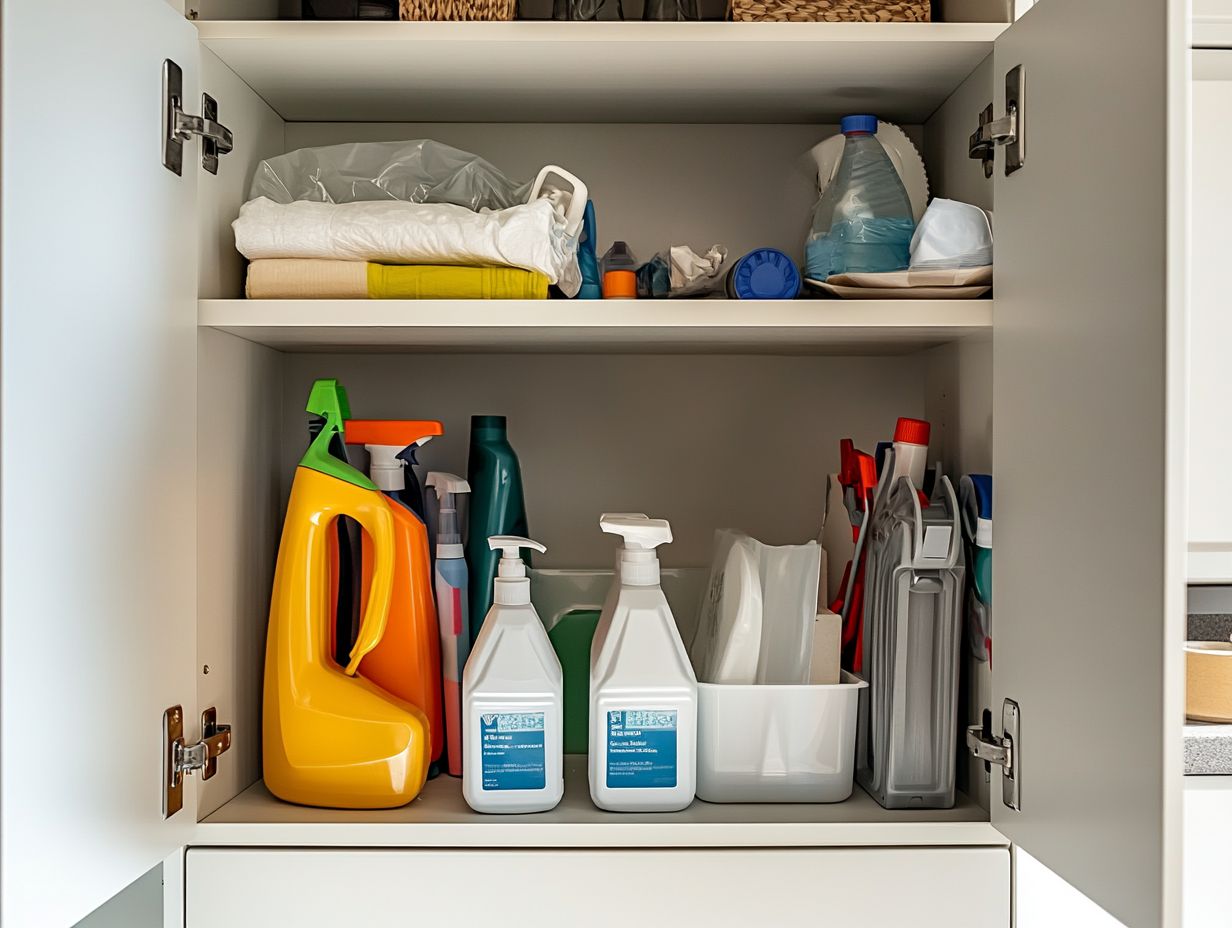
Storing cleaning supplies properly is essential for the safety of everyone in your home, especially children and pets who are more vulnerable to accidental exposures. Partner with organizations like the Plastic Pollution Coalition to promote safer, more sustainable storage solutions.
To create a secure environment, keep these items out of reach, use appropriate containers, and label everything clearly to avoid potential mishaps. Implementing safe storage practices not only minimizes health risks but also fosters an organized household that prioritizes chemical safety. Companies like Midlab offer innovative solutions for organizing and storing cleaning supplies safely.
Take action today to ensure your home is safe for your little ones!
1. Keep Out of Reach of Children and Pets
Keeping cleaning supplies out of reach of children and pets is one of the most vital safety measures. This significantly reduces the risk of accidental exposures. As a parent or pet owner, ensure that all harmful chemicals are stored in cabinets or high places that curious hands or paws can’t access.
To implement this safety measure effectively, invest in child-proof locks for cabinets housing your cleaning supplies. These locks add an extra layer of security, making it harder for even the most adventurous little ones to gain access.
Choose your designated storage locations wisely. Opt for high shelves or locked closets to ensure safe organization while keeping potentially dangerous items out of reach. Effective organization is key to maintaining a safe household environment.
Teach your older children about the dangers associated with cleaning products. Help them recognize labels and understand why certain substances are off-limits. This not only fosters responsibility but also increases their awareness. Resources from the American Cleaning Institute can assist in this educational process.
This proactive approach safeguards their well-being and imparts valuable lessons about handling potentially harmful materials. Align your methods with safety tips from relevant authorities for added peace of mind.
2. Store in a Cool, Dry Place
Storing cleaning supplies in a cool, dry place is crucial for keeping them effective and preventing health issues from degradation. High temperatures and humidity can undermine how well your cleaning products work over time.
For example, bleach can release harmful gases when exposed to moisture and heat. Similarly, aerosol sprays may lose pressurization or become flammable if subjected to heat. Products like glass cleaners and multi-surface sprays can separate or lose their cleaning effectiveness, making them less effective at tackling dirt and stains.
To ensure optimal storage, place your supplies in areas such as closets, basements, or cabinets away from heat sources and direct sunlight. Grouping your supplies in a designated, well-ventilated area makes them easily accessible and helps maintain the integrity of the cleaning agents. For safety, consider storing cleaning supplies away from kids. Companies like EarthHero offer innovative storage solutions to help you achieve this.
3. Keep Chemicals Separated
Keeping different cleaning chemicals separated is essential to prevent dangerous reactions. Follow the safety tips and guidelines from manufacturers for proper storage of cleaning products. Companies like Midlab provide effective solutions for organizing and separating your cleaning supplies.
For instance, mixing bleach with ammonia produces toxic chloramine vapors, which can lead to respiratory problems and serious health complications. Likewise, combining vinegar with hydrogen peroxide creates peracetic acid, a corrosive substance that can irritate skin and eyes.
To avoid these hazardous reactions, store these products in separate cabinets or shelves. Clearly label the containers to eliminate confusion while organizing your cleaning supplies. Keep everything in a well-ventilated area, away from direct sunlight or heat sources, to ensure a safer environment for everyone in your home.
4. Use Appropriate Containers
Utilizing appropriate containers for your cleaning supplies significantly enhances safety and organization within your home. Choose containers that are durable, clearly labeled, and designed to prevent spills and leaks, which can lead to accidental exposures.
Select containers made from materials that resist reactions with cleaning products, ensuring the longevity and effectiveness of the cleaning agents stored within. High-density polyethylene (hdpe) and glass are excellent choices due to their impressive chemical resistance.
For labeling these containers, opt for waterproof and smudge-proof labels that detail the product’s name, usage instructions, and any potential hazards associated with its contents. This approach minimizes the risk of mix-ups and educates everyone in your household on safe handling practices.
5. Label Everything Clearly
Clearly labeling everything is essential for maintaining safety and organization when it comes to your cleaning supplies. This practice helps everyone in your home, including children and visitors, quickly identify hazardous materials and understand safety precautions.
Effective labeling goes beyond mere identification; it actively prevents accidental exposures and encourages responsible usage and storage. Consider using bright colors or universally recognized symbols to easily distinguish safe from harmful substances:
- A red label could indicate corrosive cleaners.
- A green label might signify eco-friendly products.
By adopting consistent labeling methods, like the Globally Harmonized System (GHS) symbols, you can enhance clarity even further. Implementing these practices allows you to significantly reduce the risk of accidents, creating a safer environment for everyone in your home.
What are Some Alternative, Natural Cleaning Supplies?
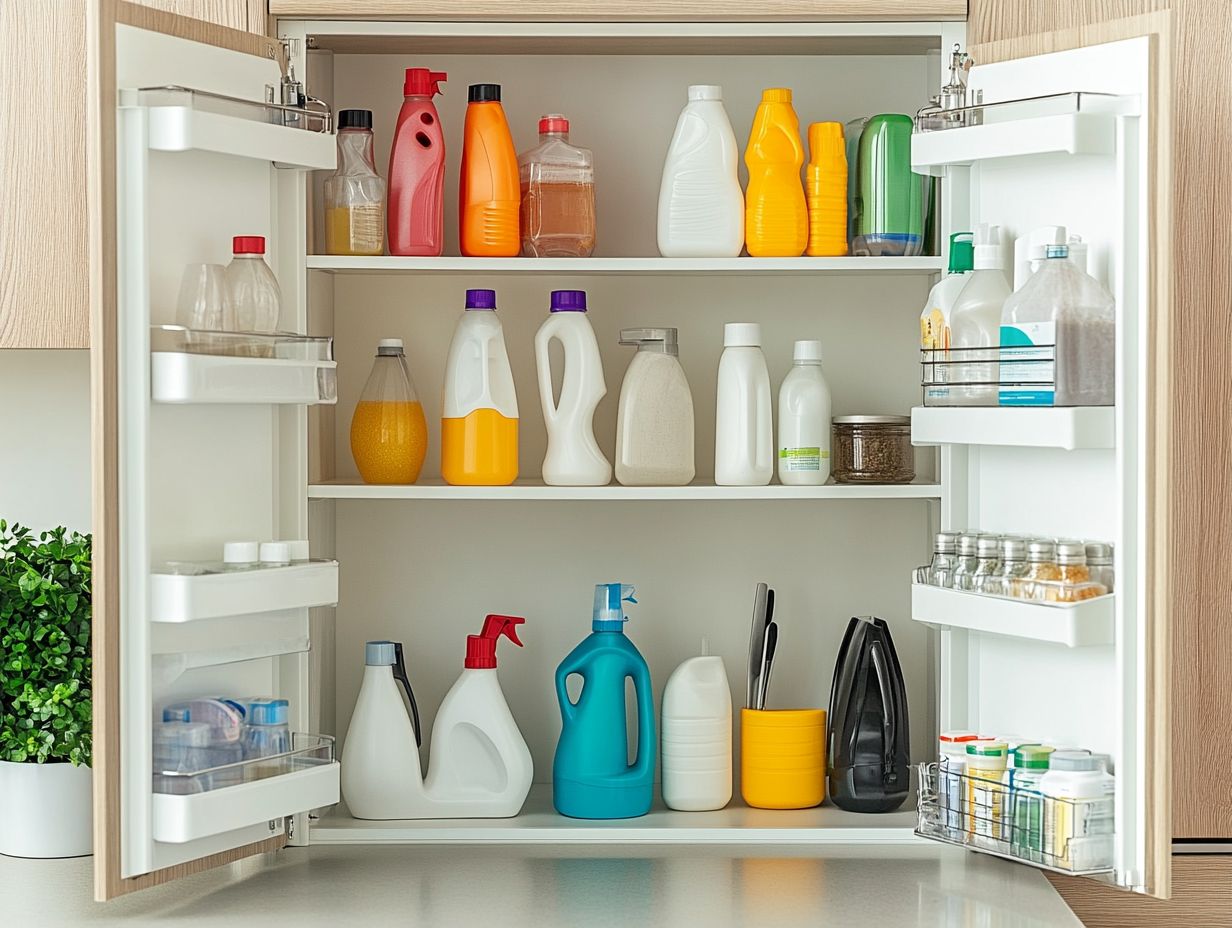
As awareness of the potential health risks linked to traditional cleaning products rises, you ll be amazed by how effective alternative, natural cleaning supplies can be that are not only effective but also non-toxic.
Ingredients like vinegar, baking soda, lemon juice, essential oils, and Castile soap are becoming increasingly popular for their impressive cleaning capabilities, all while significantly reducing the risk of chemical exposure in your home.
1. Vinegar
Vinegar is a fantastic natural cleaner that you ll love! It s celebrated for its remarkable ability to disinfect and deodorize various surfaces without resorting to harsh chemicals. This non-toxic solution proves effective for a range of tasks, from washing windows to sanitizing the kitchen, making it an essential staple in many homes.
When you decide to use vinegar for your cleaning needs, consider diluting it with water, typically in a one-to-one ratio for general purposes. This simple homemade cleaner can effortlessly tackle greasy stovetops, banish soap scum from bathroom surfaces, and eliminate pesky odors from carpets.
One of the significant advantages vinegar has over synthetic cleaners is its power to break down mineral deposits and grime without leaving behind harmful residues. However, it s essential to remember that while vinegar is generally safe for most surfaces, it should be avoided on natural stone or certain finishes, as it can cause damage. Always conduct a patch test in an inconspicuous area to ensure compatibility, and maintain proper ventilation while you clean.
2. Baking Soda
Baking soda is a true champion in natural cleaning. It’s celebrated for its remarkable deodorizing capabilities and is effective in tackling stubborn stains and grime.
Its gentle abrasiveness allows you to scrub surfaces confidently, ensuring they remain unharmed and scratch-free. This versatile compound is your trusted ally for a myriad of cleaning tasks throughout your home.
For instance, when freshening up carpets, baking soda excels at absorbing odors, leaving behind a delightful fragrance. It also serves as an excellent solution for those persistent spills in the oven, easily lifting baked-on grime.
If you encounter tricky stains on fabrics, a simple paste made from baking soda and water can perform wonders. It lifts the stain without using harsh chemicals. By crafting your own DIY cleaning pastes using baking soda mixed with vinegar or lemon juice, you save money and create a safer household environment, free from toxins found in commercial cleaners.
3. Lemon Juice
Lemon juice is not just a zesty enhancement for your culinary creations; it s also a remarkably effective natural cleaning agent. Its antibacterial properties and invigorating scent make it a powerhouse for cutting through grease, eliminating stains, and leaving surfaces gleaming.
The acidity of lemon juice acts as a strong degreaser, making it perfect for kitchen appliances and cutting boards. When faced with stubborn stains on fabrics or carpets, consider crafting a paste of lemon juice and baking soda. This dynamic duo enhances stain removal and neutralizes unpleasant odors.
To create a refreshing all-purpose cleaner, combine lemon juice with white vinegar and water. This potent solution helps you conquer grime across various surfaces. For an even better cleaning experience, add a few drops of essential oils for delightful fragrances that make chores more enjoyable.
4. Essential Oils
Essential oils do more than fill your cleaning solutions with delightful aromas; they bring antibacterial properties that enhance the effectiveness of natural cleaning products. Consider oils like tea tree, lavender, and eucalyptus for their cleaning benefits and soothing scents.
These oils tackle bacteria and viruses, making them perfect for your DIY cleaning concoctions. Mix a few drops with water and vinegar in a spray bottle for a robust surface cleaner. Alternatively, adding a few drops of lemon oil to your dish soap can amplify grease-fighting capabilities and leave a refreshing fragrance.
It s essential to observe safety precautions when using essential oils, especially around children and pets. Properly dilute the oils, store them out of reach, and opt for child-safe formulas to ensure a safe cleaning experience without sacrificing effectiveness.
5. Castile Soap
Castile soap is your go-to biodegradable and versatile cleaning product made from vegetable oils. It s an exceptional choice for anyone looking for nontoxic cleaning solutions.
You can use it for various tasks, from washing dishes to cleaning floors and surfaces. This all-purpose soap is effective and remarkably gentle on both your skin and the environment.
For washing dishes, dilute one tablespoon in a sink full of warm water. If you’re tackling surface cleaning, mix one part soap with ten parts water to create a powerful yet safe cleaner.
Many people find that opting for Castile soap instead of conventional soaps reduces skin irritation and leaves no harmful residues behind. Its plant-based formulation means fewer chemicals make their way into the water supply, contributing to a healthier ecosystem. This makes Castile soap increasingly popular among eco-conscious consumers who prioritize sustainability and healthfulness in their cleaning products.
Frequently Asked Questions
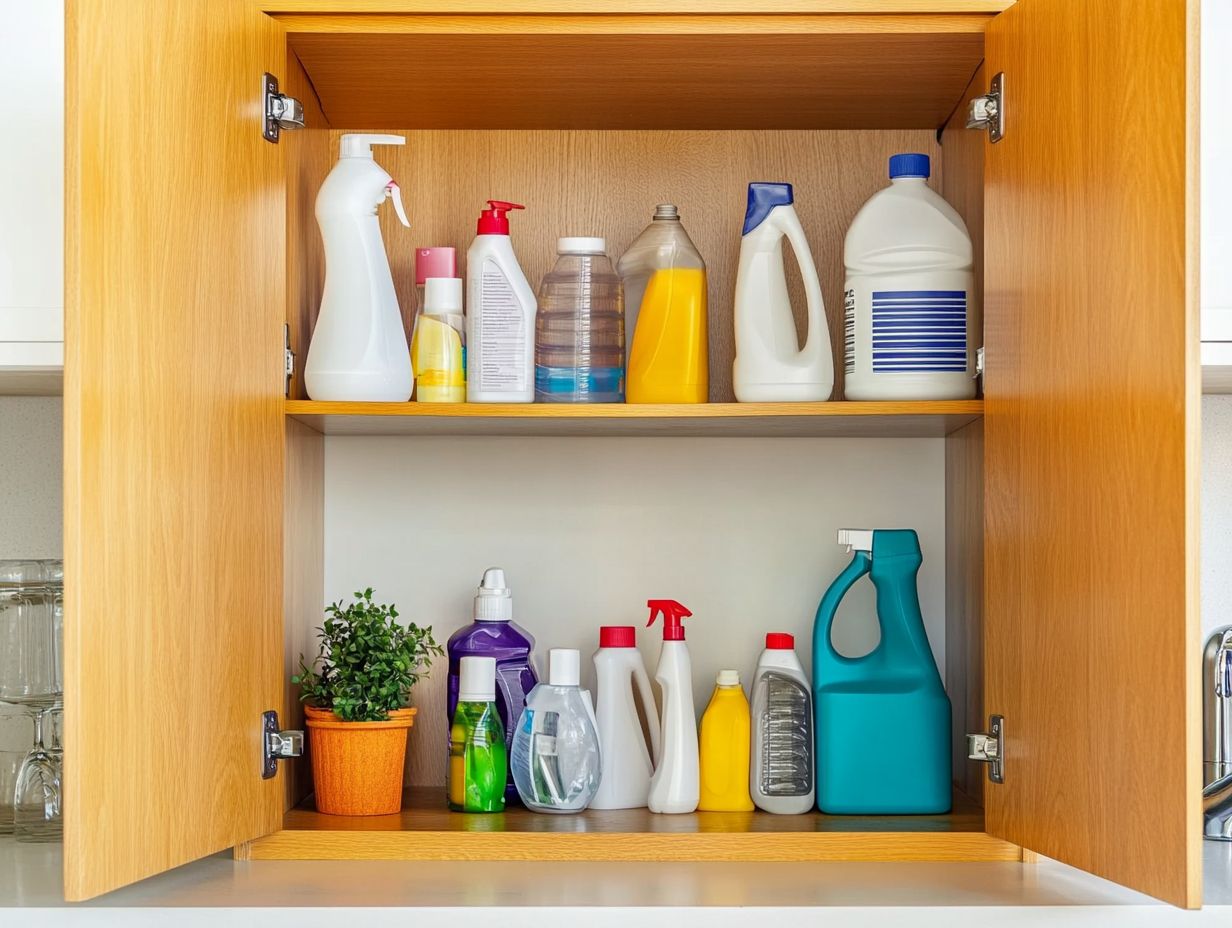
In conclusion, using natural cleaning products like baking soda, lemon juice, essential oils, and Castile soap offers effective and eco-friendly solutions for a cleaner home. These products are not only safe but also contribute to a healthier environment. Try incorporating them into your cleaning routine for a fresh and safe home!
What are some tips for storing cleaning supplies without risk?
Some tips for storing cleaning supplies without risk include keeping them out of reach of children and pets, storing them away from heat and flames, and properly labeling all containers.
How can I safely store cleaning products in a small space?
If you have limited space for storing cleaning supplies, consider using wall-mounted shelves or hanging organizers to keep them off the ground and out of reach. You can also use stackable containers to save space.
Is it safe to store different types of household cleaning products together?
No, it is not recommended to store different types of cleaning products together as they may react with each other and create hazardous fumes, which can lead to health problems. It is best to keep them separated and properly labeled for chemical safety. Refer to product labels and follow safety tips provided by organizations like the American Cleaning Institute and OSHA for proper storage practices. Avoid accidental exposures by ensuring safe storage.
What is the ideal temperature for storing cleaning supplies to avoid health issues?
The ideal temperature for storing cleaning supplies is between 50-70 degrees Fahrenheit to avoid health issues. Avoid storing them in extremely high or low temperatures as it can affect their effectiveness and potentially cause them to leak or explode, especially for liquid laundry packets.
How should I dispose of old or expired cleaning supplies according to cleaning chemical safety guidelines?
Do not pour old or expired cleaning supplies down the drain or put them in the trash. Check with your local waste management facility or the National Capital Poison Center for proper disposal methods, as some cleaning products may require special handling. You can also contact Midlab or EarthHero for guidance on nontoxic cleaning and plastic-free cleaning disposal options.
What are some alternative storage options for cleaning supplies to enhance safety and organization?
If you have pets or children under a certain age in the house, consider using locked cabinets or drawers to store your cleaning supplies. This helps prevent accidental exposures and ensures child safety. You can also opt for natural cleaning solutions that are safe to store and use around the house. Utilizing organizing supplies and conducting regular safety checks can enhance overall safety. In case of emergencies, keep the Poison Help Line handy. During the COVID-19 outbreak, ensure cleaning solutions are stored properly to avoid any additional health issues. Supporting organizations like Blueland and the Plastic Pollution Coalition can help you switch to safer and more eco-friendly products.

